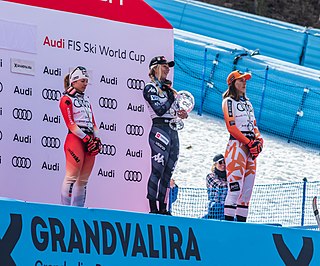
The 47th World Cup season began on 27 October 2012, in Sölden, Austria, and concluded on 17 March 2013, at the World Cup finals in Lenzerheide, Switzerland. The overall titles were won by Marcel Hirscher of Austria and Tina Maze of Slovenia.

Mikaela Pauline Shiffrin is an American World Cup alpine skier who has the most World Cup wins of any alpine skier in history and is considered one of the greatest alpine skiers of all time. She is a two-time Olympic Gold Medalist. She is a five-time Overall World Cup champion, a four-time world champion in slalom and a seven-time winner of the World Cup discipline title in that event. Shiffrin is the youngest slalom champion in Olympic alpine skiing history, at 18 years and 345 days.

Petra Vlhová is a Slovak World Cup alpine ski racer who specialises in the technical events of slalom and giant slalom. Vlhová won the World Cup overall title in 2021 and the gold medal in the 2022 Winter Olympics in the slalom event, becoming the first Slovak skier to achieve these feats.

The women's giant slalom in the 2020 FIS Alpine Skiing World Cup involved 6 events. The season had been scheduled for nine events, but all of the last three giant slaloms were canceled.

The women's slalom in the 2020 Alpine Skiing World Cup involved 6 events, although there were 9 originally scheduled.

The women's overall in the 2020 FIS Alpine Skiing World Cup involved 30 events in 6 disciplines: downhill (DH), Super-G (SG), giant slalom (GS), slalom (SL), Alpine combined (AC), and parallel (PAR). This was the first year that parallel was treated as a separate discipline; prior to the 2019–20 season, it had been a sub-element of the slalom discipline. The season had originally been scheduled to have 41 races, but 11 races that had originally been scheduled were canceled during the season, mostly due to the COVID-19 pandemic, as discussed below.

The women's slalom in the 2022 FIS Alpine Skiing World Cup consisted of 9 events, including the final.

The women's giant slalom World Cup 2021/2022 consisted of 9 events including the final. Overall World Cup leader Mikaela Shiffrin from the United States, who started out in the early lead in this discipline, contracted COVID-19 at the end of 2021 and missed the post-Christmas giant slalom, then Shiffrin lost the lead in this discipline to Sara Hector of Sweden in the first race in 2022.

The women's downhill in the 2022 FIS Alpine Skiing World Cup consisted of nine events including the finals. Defending champion Sofia Goggia of Italy, who won four of the five downhills in which she competed in 2020-21, continued her domination in 2021-22 by again winning four of the first five downhills. Goggia took a commanding lead in the discipline after American Breezy Johnson, who finished second in each of the first three downhills, missed the rest of the season with a knee injury. Goggia then suffered her own knee injury, including a broken bone and ligament tears, while training for the last downhill prior to the 2022 Winter Olympics, but she was able to continue competing within a month and, after all but the final race of the season, had such a commanding lead that only one other competitor even had a theoretical possibility of overtaking her. At the finals, Suter failed to score, and Goggia won her second consecutive discipline championship.

The women's overall in the 2022 FIS Alpine Skiing World Cup consisted of 37 events in 5 disciplines: downhill (DH), Super-G (SG), giant slalom (GS), slalom (SL), and parallel (PAR). The sixth discipline, Alpine combined (AC), had all of its events in the 2021–22 season cancelled due to the continuing schedule disruption cased by the COVID-19 pandemic, which also happened in 2020-21. In an adjustment that was partially motivated by the pandemic, each of the four main disciplines had nine races, while the parallel discipline had only one. The season did not have any cancellations.

The men's overall in the 2023 FIS Alpine Skiing World Cup consisted of 38 events in four disciplines: downhill (DH), super-G (SG), giant slalom (GS), and slalom (SL). The fifth and sixth disciplines in FIS ski events, parallel (PAR). and Alpine combined (AC), had all events in the 2022–23 season cancelled, either due to the schedule disruption cased by the COVID-19 pandemic (AC) or due to bad weather (PAR). The original calendar contained 43 events, but in addition to the parallel, four downhills were cancelled over the course of the season.

The women's giant slalom in the 2023 FIS Alpine Skiing World Cup included ten events, including the final. The season was scheduled to open in Sölden, Austria on 22 October 2022, but the race was cancelled due to bad weather and rescheduled to Semmering, Austria on 27 December.

The women's overall competition in the 2023 FIS Alpine Skiing World Cup consisted of 38 events in four disciplines: downhill (DH), super-G (SG), giant slalom (GS), and slalom (SL). The fifth and sixth disciplines, parallel (PAR). and Alpine combined (AC), had all events in the 2022–23 season cancelled, either due to the schedule disruption cased by the COVID-19 pandemic (AC) or due to bad weather (PAR). The original schedule called for 42 races, but in addition to the parallel, two downhills and a super-G were cancelled during the season.

The women's overall in the 2019 FIS Alpine Skiing World Cup involved 35 events in 5 disciplines: downhill (DH), Super-G (SG), giant slalom (GS), slalom (SL) [which included parallel slaloms and city events], and Alpine combined (AC). After this season, city events were discontinued, and a new parallel discipline was created for parallel slaloms and parallel giant slaloms.

The women's super-G in the 2019 FIS Alpine Skiing World Cup involved 6 events, including the finals in Soldeu, Andorra. Originally, the season had been planned to hold 8 events, but the two races scheduled in Sochi, Russia were cancelled due to continuing heavy snowfall.

The women's giant slalom in the 2019 FIS Alpine Skiing World Cup involved 8 events.

The women's slalom in the 2019 FIS Alpine Skiing World Cup involved 12 events, including three parallel slaloms. At the end of the season, a new discipline was created for parallel races.

The women's slalom in the 2018 FIS Alpine Skiing World Cup involved 12 events, including three parallel races and the season finale in Åre, Sweden.

The men's overall in the 2018 FIS Alpine Skiing World Cup involved 36 events in 5 disciplines: downhill (DH), Super-G (SG), giant slalom (GS), slalom (SL), and Alpine combined (AC). Marcel Hirscher of Austria won the overall title for the seventh consecutive time. Although Hirscher had broken his ankle in August, prior to the start of the season, he clinched the title a full two weeks before the season finals in Åre, Sweden. In so doing, Hirscher extended his own record of six consecutive overall World Cup titles, which he had set the season before, and set the all-time record with seven overall, as the prior record was six, set by Annemarie Moser-Pröll in 1978-79.












